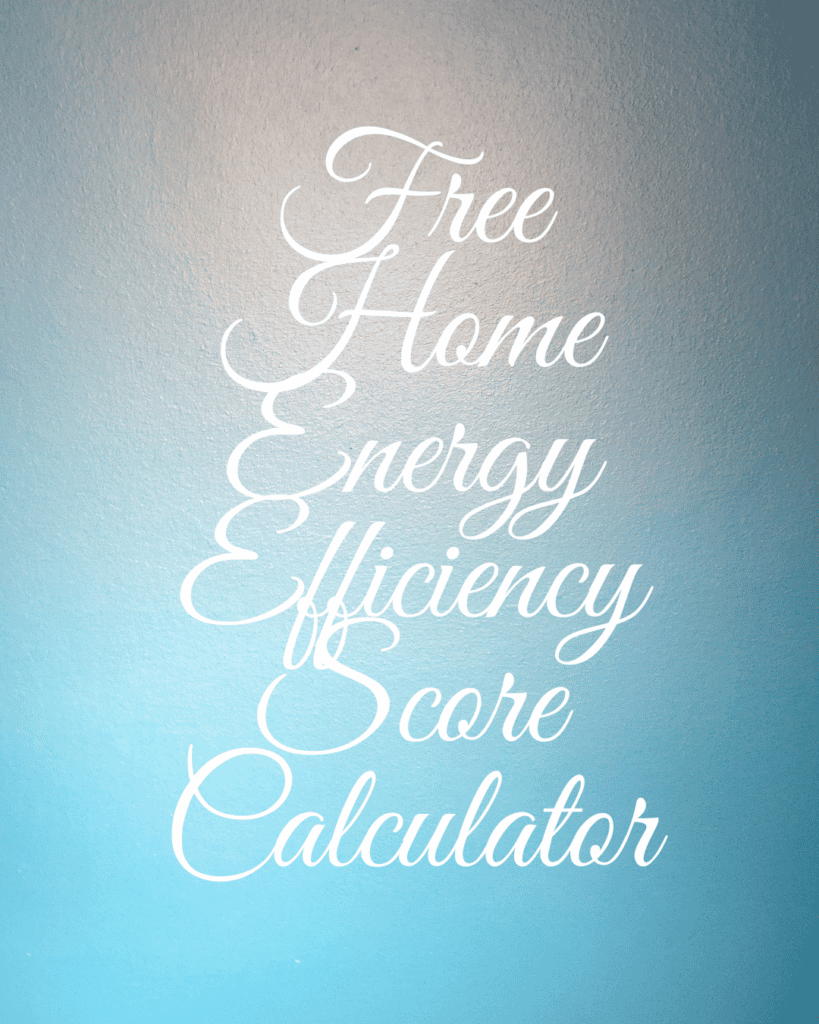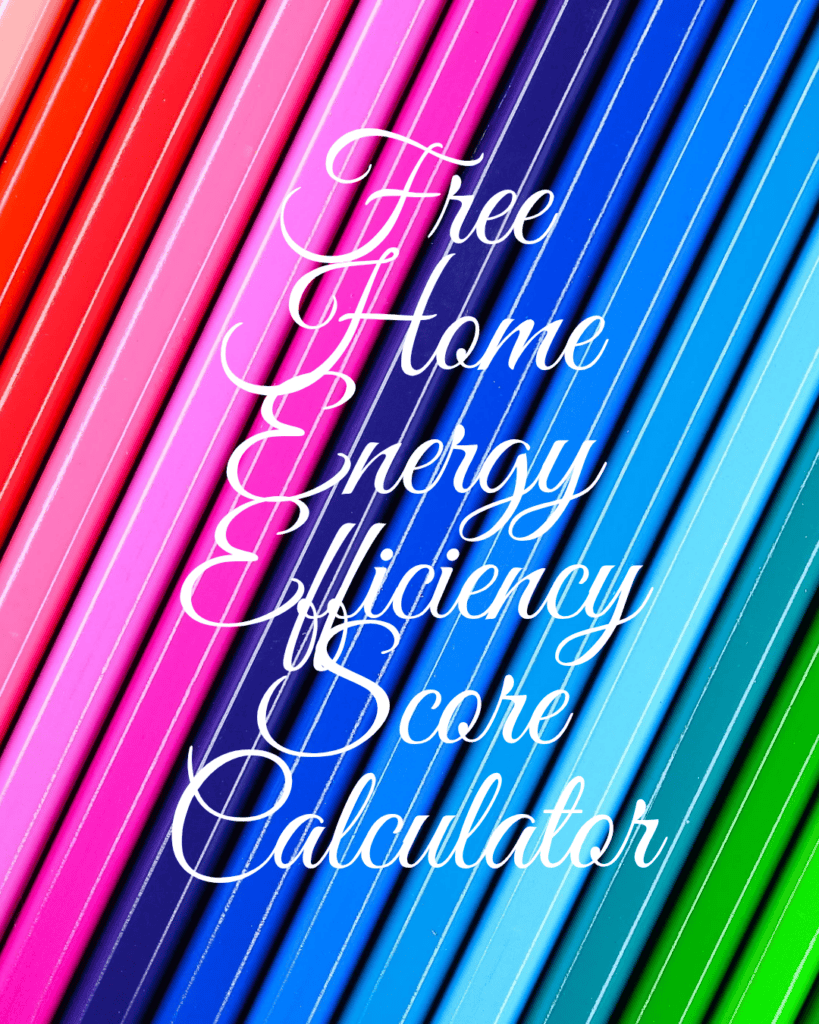Small Wind Turbine Sizing Calculator
Free Home Energy Efficiency Score Calculator
Similar to miles-per-gallon ratings for cars, the Home Energy Efficiency Score makes it easy for homeowners to compare homes in an objective way and provides cost-effective improvements that could save energy and money.

Professional home energy assessments (often known as energy audits) offer more in-depth information about how your house consumes and expends energy. A thorough energy assessment will include tests like blower door testing, insulation inspection and safety checks on combustion appliances - along with recommended upgrades with their estimated savings potential.
How it works
Home Energy Scores provide homeowners, prospective buyers and renters with direct, comparable and credible information about the energy performance of their homes. Similar to miles-per-gallon ratings on vehicles or nutrition information on food items, the Home Energy Score provides direct, comparable and credible insight into a home's performance.
Energy efficiency can be difficult to assess without undertaking an onsite energy assessment, making the Home Energy Score the ideal way to compare building energy usage against that of nearby properties while taking weather variations into account for accurate comparisons.
The scoring methodology deliberately leaves out variables related to how residents operate their homes and non-permanent features like lighting, appliances and electronics in order to provide apples-to-apples comparisons between homes - similar to how mile per gallon ratings don't account for driving habits - in order to help prospective buyers see that energy usage would likely remain similar under their ownership as in someone else's, thus helping them budget accurately for monthly utility costs.
To obtain a Home Energy Score, owners and prospective homebuyers need only provide utilities bills from the last year and floor plans of their property to ENERGY STAR for analysis. Based on this input data, ENERGY STAR calculates an estimate comparison against other homes nearby, taking into account size, style, age and other factors to calculate expected energy consumption estimates for given properties.
As part of its Climate Action Plan 2.0 Action Item B4, Eugene has joined with ODOE to offer residents of Eugene a voluntary Home Energy Score program that is easy to use, provides reliable savings data, and optimizes energy solutions.
Homeowners can obtain a free Home Energy Score by filling out an online application, taking an energy survey and providing basic contact details. A certified Home Energy Score assessor will then visit and conduct an in-depth property inspection, followed by compiling a report featuring ratings on a scale from 1-to-10 as well as recommendations on cost effective ways to increase energy efficiency.
How to use it
If you're thinking of selling your home, a free online energy calculator can be an effective way to assess its energy efficiency prior to listing. But beware: these calculators may not provide accurate or complete results; for instance, inaccurate weather information is often used when calculating scores and they don't take into account energy-saving equipment or appliances when scoring the score of your house.
Professional energy assessments provide more precise and detailed reports. An energy assessor will conduct a full inspection of your home, including its building envelope, mechanical systems, insulation, and water heating system - and recommend cost-effective improvements that could lower energy costs. A Home Energy Score assessment typically takes less than an hour.
The ENERGY STAR website also provides a free online Home Energy Check tool that allows you to compare the performance of homes in your area. Simply select your heat source (gas and electricity), square footage, number of occupants and utility bills to see how much energy your home consumes as well as the costs involved with its usage; finally compare that usage against that averaged in your county to determine its efficiency.
An increasing number of cities and states are mandating Home Energy Scores when listing homes for sale publicly. Bend, Oregon for instance mandates all homes must possess one prior to being put up for sale - similar to gas mileage ratings on cars and nutrition facts on food, the Home Energy Score provides potential homebuyers an estimate of energy usage costs associated with purchasing the property.
The report includes an estimate of the impact of various energy-saving improvements on both your home's performance and projected annual energy bills, along with tips to lower energy costs and additional home energy-saving resources. Neighbor Impact operates the Home Energy Score program free of charge for households earning 80% or more than median income in their area - to find out if you qualify, visit their program webpage for further details.
Results
Home Energy Scores are measured on a simple one-to-10 scale, with 10 representing the most energy efficient homes. They indicate how much energy a home is expected to use annually as well as estimates for savings with recommended improvements.

The calculation uses information about your home, such as its size and location, along with a database of average energy prices and consumption for similar homes in your area. It compares your estimated electricity use to that of a similar home of similar square footage with similar appliances - all while taking weather into account to provide a reliable estimate of savings potential.
This report offers customized improvement recommendations that can be cost-effectively implemented to decrease energy costs. It includes estimates of potential annual savings (including carbon reduction) as well as their 10-year payback periods.
If your home features a photovoltaic system, this tool will credit any PV generation that occurred during the reporting period to its energy consumption. Additionally, additional metrics and values for estimating energy consumption such as plug loads' electricity use is also provided in the report. It is important to keep in mind that MBtu numbers only represent energy consumed on-site - they do not account for transmission or distribution losses.
A home that scores 10 is considered energy efficient and is expected to consume less energy than 90% of existing U.S. homes; one which scores 1 is expected to use the highest amount of energy of all homes evaluated.
Home Energy Scores are revolutionizing the residential market, making it easier for homeowners to understand and control their energy use. Some regions such as Bend Oregon even make these scores mandatory when listing homes for sale.
Home Energy Scores can help homeowners sell their properties more quickly and at higher prices while cutting utility costs and environmental impacts. They may also make qualifying for green mortgage products or solar financing easier - such as those provided by Connecticut's Green Bank.
Conclusions
The Home Energy Efficiency Score Calculator is an easy-to-use tool designed to assist homeowners and home buyers gain a clearer picture of a homes energy efficiency. Users simply input accurate appliance details, such as wattage and voltage, along with their estimated number of hours used; then this data can be used to calculate daily, monthly and annual energy consumption and costs; it may also help identify hidden energy drains such as Phantom Power; determine when any improvements such as replacing old appliances with more ENERGY STAR certified models will start paying back their costs through energy cost savings savings over time - perfect!

Home Energy Score, a nationally-recognized rating system that ranks homes based on performance, measures energy efficiency. A score of 1 indicates less efficiency than 85% of similar homes while 10 represents highly energy-efficient houses. If a homeowner wants to increase the energy efficiency of their home they can take advantage of professional assessments which include an inspection as well as assessments for windows, insulation, roof and furnace efficiencies as well as recommendations and cost estimates of any energy-saving improvements needed in their house.
An assessment usually lasts about an hour and can be completed in the comfort of one's own home. It should be noted, however, that homes with many appliances or electric vehicles may require longer to assess. In such instances, conducting a DIY energy assessment could prove more efficient.
Home efficiency upgrades not only reduce energy costs, but they can also have a profoundly positive environmental impact. By decreasing energy usage and emissions related to global climate change, these upgrades help alleviate strain on natural resources while decreasing greenhouse gas emissions that contribute to global climate change. Prospective home buyers can also take advantage of conducting an energy assessment in order to understand their energy score and assess any cost-effective improvements before buying; in fact, all properties listed for sale in Bend now must include one as part of their listing information.
